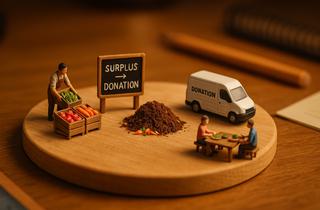What Canadian businesses can learn from France's food waste revolution
June 26, 2025
Every day, one billion meals are thrown away while millions go hungry. This massive contradiction wastes precious resources, accelerates climate change, and deepens inequality.
In 2016, France became the first country to ban supermarket food waste. This law required retailers to donate surplus food instead of just discarding it. The results were transformative: millions more meals reached people in need, food waste dropped dramatically, and a global movement for change began.
For Canadian businesses, France's success offers a proven blueprint. It's a chance to turn a crisis into an opportunity, strengthen communities, and improve the bottom line. The key question is: will your business be ready when Canada considers similar measures?

The French success story: a model for change
France's law was a direct response to the clear environmental and social problems caused by food waste. When food is thrown out, it means all the resources used to produce and transport it – like water, land, energy, and labor – are also wasted.
Following this 2016 legislation, food donations from supermarkets significantly increased, with reports showing a rise of over 20% and tens of thousands of tons of food rescued annually. This contributed to an extra 10 million meals for those in need and was part of wider national efforts that saw some figures suggest around a 41% reduction in overall food waste. Beyond wasted resources, food rotting in landfills releases methane, a potent greenhouse gas far worse for global warming than carbon dioxide. All this occurs while many, even in Canada, go hungry.
France’s experience proves that strong actions deliver big results. For Canadian businesses, this is a clear signal. Even without identical laws yet, it’s a chance to learn, improve, and lead. Taking steps now helps the environment and communities, improves profits, and builds a better reputation, positioning businesses ahead of any future regulations.
Practical lessons for Canadian businesses
First, understand your waste by doing a comprehensive review.
French supermarkets had to figure out how much surplus food they had to manage it effectively. Similarly, Canadian businesses need a clear picture of what, where, and how much waste they generate. A professional waste assessment is much more than a quick look. This process carefully analyzes your entire waste stream. It identifies different types of waste like food, recyclables, and items headed for the landfill. The assessment measures volumes, checks if current pickup schedules match your actual needs, and evaluates how well your sorting practices are working. This detailed, data-driven approach finds hidden inefficiencies and contamination problems that could be costing you money. It also pinpoints immediate ways to save money and improve waste diversion, especially for heavy and often expensive food waste.
Next, focus on source reduction.
This means stopping waste before it even starts. The French rule about donating surplus food naturally encourages businesses to control their inventory better. Canadian businesses can also see big benefits from this. It involves smart purchasing to better match demand and using efficient inventory management systems. A key technique here is FIFO (First-In, First-Out). Simply put, this means organizing your stock so that older items get used before newer ones. This helps reduce spoilage significantly. For example, when restocking shelves or walk-in coolers, always place new items behind the existing stock. This ensures that products closer to their expiry dates are sold or used first. In food service, planning menus creatively to use ingredients across multiple dishes can also minimize off-cuts and waste. Training staff on waste-conscious preparation and handling is also vital.
Build meaningful donation partnerships.
A major reason for France's success is the legal requirement to donate food, which directly helps fight food insecurity. Canadian businesses can achieve similar positive social impact by partnering with donation organizations. Canada has excellent organizations dedicated to rescuing and redistributing food. For example, Moisson Rive-Sud, a key food bank on Montreal's South Shore, collects and gives food to many community organizations in its area. Nationally, Second Harvest, Canada's largest food rescue organization, works to protect the environment by keeping good food out of landfills. They also help relieve hunger by giving surplus edible food to non-profits and Indigenous communities. Setting up clear and regular donation systems with such partners for your safe, surplus food is a powerful way to show corporate citizenship. It keeps valuable resources out of landfills and directly helps people in your community who need it most.
Implement robust composting programs.
Even with the best efforts to reduce waste and donate food, some food scraps are unavoidable. For these, composting programs are essential to complete the cycle responsibly. While the French model focuses on edible surplus, a complete strategy must also deal with non-donatable organic matter like vegetable peelings or food that's no longer safe to eat. Sending this material to landfills is an environmental mistake. Comprehensive composting solutions include providing the right-sized, clearly labeled bins, setting up reliable collection schedules, and making sure organic waste goes to certified facilities. There, it's transformed into nutrient-rich compost, instead of becoming a source of potent methane in a landfill.
Why this matters for your business
Today's consumers, especially younger ones, actively look for and support businesses that show a real commitment to sustainability, ethical practices, and community well-being. Managing your food waste transparently can make your brand stand out. This improves your corporate social responsibility and reputation.
Beyond your company's image, there are real cost savings. Buying less food, optimizing waste collection contracts based on actual needs (which often decrease once food waste is diverted), and avoiding potential overweight bin fees all add up. Furthermore, employees are often more engaged and motivated when they work for a company that shares their values and makes a positive impact. Finally, by proactively dealing with food waste now, your business future-proofs its operations. Environmental rules are always changing, as we see with initiatives like Quebec's push to divert organic matter from landfills and Ontario's new Blue Box Regulation shifting responsibility to producers. Leading in waste reduction and diversion today prepares your business for these and any future regulatory changes.
Don't wait for a mandate
France's success with its food waste law sends a clear message: real progress is not only possible, it's essential. Canadian businesses have a unique chance to learn from this model and start using proactive, effective strategies today. This effort is about more than just managing trash. It's about embracing a culture of responsibility, promoting greater social fairness, and actively helping to create a healthier, more sustainable planet, especially as local regulations increasingly demand these actions.
Ready to change your business's approach to food waste and enjoy the benefits of sustainable practices? Knowledgeable partners can help you start with a thorough waste assessment. We can identify ways to reduce food waste, design effective programs including streamlined composting, and guide you in exploring how your business can make a real contribution to a more sustainable food system in Canada.
Ready to get started?
Let’s make waste management simple and sustainable together! Reach out today for a free consultation customized for your business.
